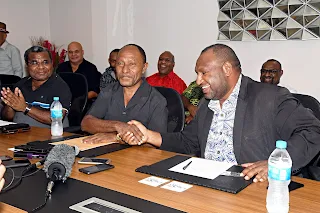The hurdles in ousting Peter O'Neill as Prime Minister
Intense lobbying is going on
between politicians to muster numbers in electing a Prime Minister through a
motion of no confidence against incumbent Peter O’Neill.
The motion is
likely to be moved when Parliament resumes next week, May 7.
At this stage,
we don’t know who would be the candidate.
Peter O’Neill
though has enjoyed a strong and stable Government since his ascension and
controversial election as Prime Minister on August 2, 2011.
He then
successfully returned as Prime Minister after two national general elections-
2012 and 2017.
 |
| Peter O'Neill (right) sitting in Parliament |
His ruling
People’s National Congress (PNC) party in 2017 mustered majority of the
electoral wins and was invited by the Governor General to form government which
he did and enjoyed stability and cohesion since.
Grand Chief Sir
Michael Somare was the last longest serving Prime Minister who held the post
for a record nine years (2002 to 2011).
Despite Peter
O’Neill’s much stabilised reign, there were serious and constant allegations
labeled against his government for mismanagement, running the economy down,
corruption, breaches of law, favoritism in offering contracts- allegations
mainly issued by the Opposition, pressure groups and political commentators.
But Prime
Minister Peter O’Neill has never been weakened and countered the allegations
through some well crafted public relations responses playing down the severity
of the allegations and pointing people to increased infrastructure
developments.
He was loved,
admired, praised and his coalition government numbers increased to a
comfortable 86.
But the recent
events of resignations by his government ministers’ (James Marape –Finance and
Davis Steven- Justice and Attorney General) and MP’s defecting from his PNC
party though minor from his standpoint- it’s been rattling and Papua New
Guineans with their rationale conclude that things are not right within Peter
O’Neill’s coalition.
If we were to
prematurely crunch numbers, Peter O’Neill has about 79 members, that includes
West Sepik’s Governor Anthony Wouwou who did an unorthodox move
courting one anti-O’Neill camp comprising members of the Opposition, made news
headlines that he had defected but within less the 24 hours made news headlines
again courting his party leader Peter O’Neill and dispelling media reports he
left the party.
 |
| Tari Pori MP James Marape (right) shaking hands with Morobe Governor Ginson Saonu, |
The Opposition
has 24 members and excluding the Speaker, the balance of seven dissenting MP’s
would most likely vote against Peter O’Neill.
While lobbying
and strategic political maneuverings and discussions may not have reached the
mass media, surely there are deep discussions behind the scenes.
People
everywhere are watching with keen interest through social media, radio, TV,
newspapers and online news media.
As it is, there
are three options likely to eventuate after all the political hype and lobby
against Peter O’Neill is settled within the next possible three weeks.
I say three
weeks because a notice of motion to move a vote of no confidence has to be
presented to the Speaker of Parliament, a week before it is moved.
The motion will
be vetted by a committee chaired by the Speaker and the motion must be signed
by several MP’s who also propose the alternate Prime Minister.
So there’s a
bit of work to do for any one or group to first muster the magic number of 56
and then get the nod from the Speaker and his committee.
If Peter
O’Neill was to survive the vote of no confidence, though he has been confident
and firm that his coalition government was intact and as vibrant as ever, he
must be reminded that cracks have surfaced from within and he must be at his
best than ever to counter.
He must hold
strong the 79 he has as turn of events indicate shocking decisions can be made
when you least expect it.
He must first
ensure he is not voted out in the party caucus meeting.
James Marape
has been forthright this week, he wants the PNC party leadership to be
tabled-essentially he says he does not want Peter O’Neill to lead the party and
be the Prime Minister.
Does James
Marape imply he was one of many within the party who desires a change in party
leadership?
Peter O’Neill
has since responded that Marape was not welcome in the party caucus meeting.
The second
option which could work to replace Peter O’Neill as Prime Minister is a major
dissent from within the government coalition who votes against him. Again the
magic number is 56.
The third which
uses a similar modus operandi as the above in the vote of no confidence-the
person can be from the coalition government or the opposition but they must
convince and secure 56 votes to oust Peter O’Neill.
The first
hurdle though is an alternate Prime Minister must have been chosen within the
next six days.
While that looms, Papua New Guineans observe
with keen interest how this would eventually pan out as lobbying
intensifies and THE day gets closer day by day.
















No comments